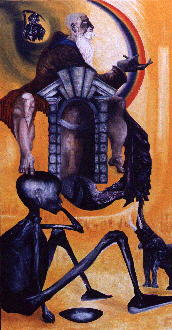
























The Return of Pol-Pot
( Size: 17" x 32.75" Oils )
Kampuchea, former name Cambodia. A country in SE Asia, in the Indo-China Peninsula on the
Gulf of Thailand. It consists mainly of an alluvial plain drained by the river Pekong
and enclosed by mountains. Most of the inhabitants are Khmers, with small minorities of
Vietnamese and Chinese. The economy is predominantly agricultural, the staple crop being
rice. Production has been severely reduced by the recent political upheavals and there
is very little industry.
 Official language: Khmer; French is widely spoken.
Official language: Khmer; French is widely spoken.
Currency: riel of 100 sen, population approx.; 8,000,000
Capital and the countries main port: Phnom Penh.
After the formation of a new constitution in 1975, the Khmer Rouge government led
by Pol-Pot attempted to reshape the country's economy on co-operative lines by driving
the Kampucheans out of the towns, depriving them of their property and killing some
three million of the aged, the sick or the dissenting. In 1978 after the nightmare
of Pol-Pot, the Vietnamese invaded and a People's Revolutionary Council was set up
under Heng Samrin. The retreating Khmer Rouge burnt existing rice stocks,
devastated the land, leaving behind them a trail of famine and disease - and the
endless mountains of skulls of the 'Killing Fields'. This being Pol-Pot's legacy
to mankind.
Now it seems that this psychopath is hell-bent on a return to regain power over
Kampuchea. The rest of the world, with the knowledge within recent history
before them, seem to be oblivious except for a few muted raised voices aware of
the evils to come. History once again, if unchecked, will undoubtedly repeat itself.
Subjects in the painting:
The Man with Hand Held Out
This figure, all powerful of Pol-Pot, who probably
believed he came as a saviour, but in the reality he became an evil, tyrannical,
megalomaniac. Taking away the dreams and the light from peoples destinies, he held
the power of forced darkness.
The Grim Reaper
The oppressive stench of death, like a dark cloud hanging over the
demoniac presence of Pol-Pot.
The Emaciated Black Man
By depicting the already oppressed and depraved black man as
to an Indo-Chinese person, this portrays that the only people to suffer under any
oppressive regime are the weak and ordinary: poor people. So the colour of the skin
is immaterial. The suffering is elongated usually by controlled starvation, forced
labour, and eventual death, ubiquitous with the presence of the force of evil
within Pol-Pot's despotic regime.
The Elephant
Another of Mother Earth's children sought after
for man's pleasure. These gentle creatures who by man's greed are on the
verge of extinction, are to man synonymous with the realms of memory, so we
must act quickly so as to never forget the lessons taught to us by history.
Stone Structure & Ghostly Apparition within
Represents Kampuchea, and its history and beliefs.
These cannot be eroded by the onslaught of violence of Pol-Pot's regime. The ghostly
figure holds up a shield, this represents that the fight, even though taken underground,
will with fervent tenacity ensure the downfall of this evil man's return.
The Empty Plate
Life without sustenance, controlling the food chain, death
becomes a way of releasing oneself of this slow but deliberate horror.
E.W.Powell 22/8/90
Complexity comment:
Utopian thinking imagines a 'perfect' end result, and then tries to enforce it in
one vast move (change required equals end state minus start state). This cannot work.
Complexity studies show that, for closely interacting systems, change in one
parameter will cause co-evolutionary changes in unexpected others - so plans
based on assuming that those will remain unchanged will fail (as they do not
take into account the inevitable shifts in important variables).
To move from one position to another, a step by step process is required. In
other words, evolutionary progression not catastrophism. We perform a directed
walk of micro-improvements and eventually will reach our goal, as long as we
monitor each result and plan the next move from the NEW starting position.
Page Version 1.1 October 1998


 Official language: Khmer; French is widely spoken.
Official language: Khmer; French is widely spoken.